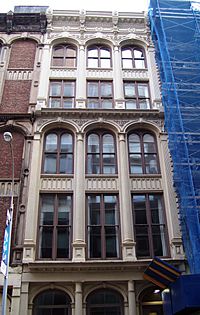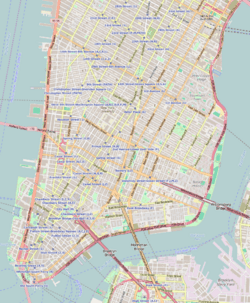- This page was last modified on 17 October 2025, at 10:18. Suggest an edit.
Kitchen, Montross & Wilcox Store facts for kids
|
Kitchen, Montross & Wilcox Store
(85 Leonard Street) |
|

(2012)
|
|
| Location | 85 Leonard Street Manhattan, New York City |
|---|---|
| Built | 1861 |
| Architect | James Bogardus (cast-iron) |
| Architectural style | Italianate, Cast Iron |
| NRHP reference No. | 80002675 |
| Significant dates | |
| Added to NRHP | April 23, 1980 |
The Kitchen, Montross & Wilcox Store is a historic building in New York City. It is located at 85 Leonard Street in the TriBeCa neighborhood of Manhattan. This building was finished in 1861. It was built for a company that sold "dry goods," which were things like fabrics and clothing.
The building is special because of its unique style. It uses an Italianate style with a special material called cast iron. The cast iron for the front of the building came from the famous ironworks of James Bogardus. He was a very important architect and inventor. This building is one of the few left that used his cast-iron designs.
The Kitchen, Montross & Wilcox Store is considered a very important building. It was named a New York City landmark in 1974. Later, in 1980, it was added to the National Register of Historic Places. This means it is recognized as a significant historical place in the United States. The building is also part of the Tribeca East Historic District.
Contents
A Look at the Building's Style
The Kitchen, Montross & Wilcox Store shows off a cool architectural style. It mixes classic design ideas with new ones. The building looks light and open. It also seems to reach upwards, which is a common feature of cast-iron buildings.
What is Cast-Iron Architecture?
Cast iron is a strong metal. It can be poured into molds to make many different shapes. In the 1800s, architects like James Bogardus used cast iron to create beautiful building fronts. This allowed them to make detailed designs that looked like stone. But cast iron was cheaper and faster to use. It also made buildings feel more open with large windows.
The Italianate Style
The Italianate style was popular in the mid-1800s. It was inspired by Italian Renaissance buildings. Key features often include tall, narrow windows. They also have decorative elements like cornices (fancy ledges) and columns. The Kitchen, Montross & Wilcox Store combines these classic looks with its modern cast-iron structure.
Why is This Building Important?
The Kitchen, Montross & Wilcox Store is important for several reasons. It shows how buildings were made in the 1800s. It also highlights the work of James Bogardus. His use of cast iron changed how buildings were constructed.
Landmark Status
When a building becomes a "landmark," it means it's special. It has historical or architectural value. Being a New York City landmark helps protect the building. It ensures that its unique features are kept for future generations. Being on the National Register of Historic Places gives it even more recognition.
Related pages
See also
 In Spanish: 85 Leonard Street para niños
In Spanish: 85 Leonard Street para niños



